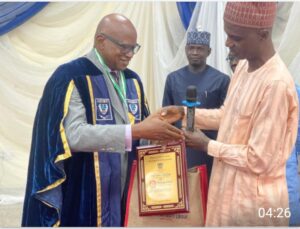

,,,,, Professor Adegoke’s Vision for Small Dams.

The Distinguished lecturer.
By correspondent in Lokoja.
In a recent 10th Distinguished lecture at Federal University, Lokoja, kogi state, north central Nigeria,Professor Jimmy Adegoke, an expert in climate science and sustainable development granted with journalists, depicting his compelling vision for transforming Nigerian agriculture through small-scale water retention strategies. 
Prof. Jimmy Adegoke(left) receiving gift from the Vice Chancellor,FUL, Prof.Akinwumi Olayemi.
Adegoke had spoken extensively on the theme, “A Tale of Two Cities: Climate Threats and Economic Opportunities at the Confluence of the Great Rivers Niger and Benue,”at the university’s Felele campus.
He stressed the need for the government to better utilize Nigeria’s major rivers, the Niger and Benue, for agricultural purposes, explaining that, currently, these rivers provide limited support for farming due to the unimpeded flow of water to the ocean.
He called for implemention of small-scale, localized dams, known as earth dams policy to enable Nigeria slow down river water flow, and for farmers to have access to water throughout the year.
“Rivers like the Niger and Benue primarily move water to the sea daily.
“However, by strategically creating small dams, we can capture this water, ensuring that it benefits local agriculture before flowing out to sea,” said
The Professor noted that countries worldwide have effectively used earth dams to retain water, creating reliable water sources for agriculture even in dry seasons.
Adegoke pointed out that Nigeria’s reliance on rain-fed agriculture limits the country to a single growing season per year in many regions.
The distinguish lecturer added,”Crops like rice, corn, and beans are typically planted just once annually due to seasonal rainfall, which in some areas lasts only from June to September.
“By retaining river water, Nigeria could support multiple growing cycles each year, potentially tripling harvests for short-term crops like corn and beans,” the expert in environment said.
He expressed optimism that small, cost-effective dams,if given consideration,could significantly boost food production, reduce dependency on seasonal rains, and stabilize the country’s agricultural productivity.
“Imagine harvesting corn or beans every three months instead of just once a year,” Adegoke remarked. The only thing standing in our way is access to water,” he explained.
Beyond the Niger and Benue, he urged that other rivers, such as the Kaduna and Ogun, could be tapped for constructing small dams.
This approach, he suggested, could create a network of water retention systems across Nigeria, providing year-round water supply to agricultural zones and helping mitigate the effects of drought and irregular rainfall.
In calling for action, Adegoke further urged the Nigerian government and farmers to prioritize small-scale water retention projects, noting that the benefits extend far beyond agriculture.
“Year-round farming would increase employment, strengthen rural economies, and reduce Nigeria’s reliance on food imports,” he said, advocating for a shift towards a resilient, self-sustaining agricultural model.
Experts agree that adopting Adegoke’s vision could vastly improve Nigeria’s food security by transitioning from rain-dependent farming to a more sustainable system.
By making this shift, they added,Nigeria would not only enhance its agricultural productivity but also fortify its economy against climate-related challenges.
The Vice-Chancellor of the University, Professor Akinwumi Olayemi Akinwumi,in his address of welcome,applauded Adegoke’s insights, emphasizing the university’s commitment to addressing environmental risks and exploring economic opportunities.
“Today, we are honored to welcome Professor Jimmy Adegoke, a leading expert in climate science and sustainable development.
“His insights offer valuable perspectives on protecting our region while fostering growth,” Akinwumi stated.
No doubt,Professor Adegoke’s lecture underscored a clear message: If Nigeria wants to improve its agricultural productivity, it must harness its water resources more effectively.
Experts in Agriculture and environment believe that the distinguish lecturer’s approach offers a roadmap for transforming Nigerian agriculture into a year-round venture, thereby strengthening food security, creating jobs, and building a more resilient future for the country.
Edited by Dada Ahmed.


